介词for 的常见用法归纳
介词for的用法归纳
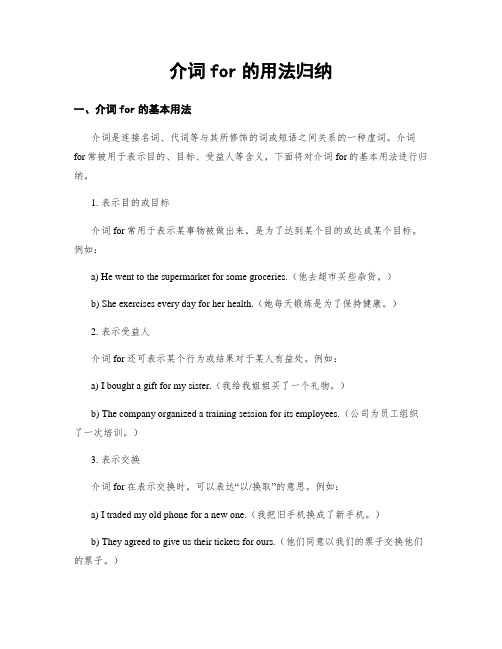
介词for的用法归纳一、介词for的基本用法介词是连接名词、代词等与其所修饰的词或短语之间关系的一种虚词。
介词for常被用于表示目的、目标、受益人等含义,下面将对介词for的基本用法进行归纳。
1. 表示目的或目标介词for常用于表示某事物被做出来,是为了达到某个目的或达成某个目标。
例如:a) He went to the supermarket for some groceries.(他去超市买些杂货。
)b) She exercises every day for her health.(她每天锻炼是为了保持健康。
)2. 表示受益人介词for还可表示某个行为或结果对于某人有益处。
例如:a) I bought a gift for my sister.(我给我姐姐买了一个礼物。
)b) The company organized a training session for its employees.(公司为员工组织了一次培训。
)3. 表示交换介词for在表示交换时,可以表达“以/换取”的意思。
例如:a) I traded my old phone for a new one.(我把旧手机换成了新手机。
)b) They agreed to give us their tickets for ours.(他们同意以我们的票子交换他们的票子。
)二、介词for的进一步用法除了上述基本用法外,介词for还有一些特殊用法需要注意。
下面将进一步归纳这些用法。
1. 表示时间段介词for可以表示一个时间段的长短。
例如:a) I have been studying English for three years.(我学习英语已经三年了。
)b) He will be away on a business trip for a week.(他将因公出差一个星期。
)2. 表示代替或代理介词for还可表示某人代替另一个人做事或担任职务。
(完整版)介词for用法归纳
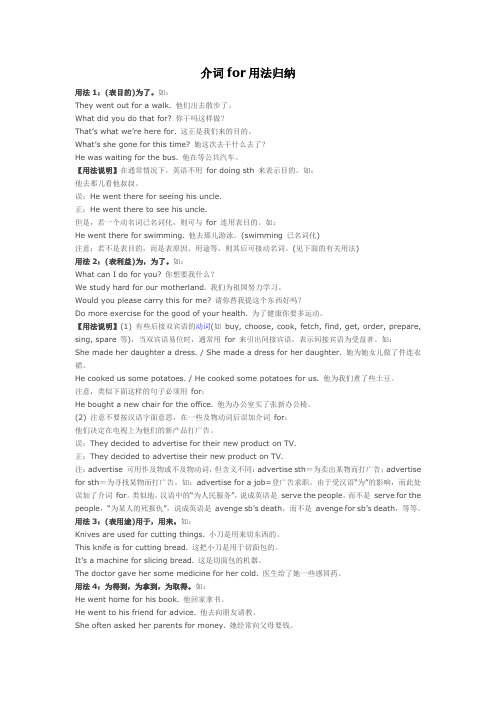
介词for用法归纳用法1:(表目的)为了。
如:They went out for a walk. 他们出去散步了。
What did you do that for? 你干吗这样做?That’s what we’re here for. 这正是我们来的目的。
What’s she gone for this time? 她这次去干什么去了?He was waiting for the bus. 他在等公共汽车。
【用法说明】在通常情况下,英语不用for doing sth 来表示目的。
如:他去那儿看他叔叔。
误:He went there for seeing his uncle.正:He went there to see his uncle.但是,若一个动名词已名词化,则可与for 连用表目的。
如:He went there for swimming. 他去那儿游泳。
(swimming 已名词化)注意:若不是表目的,而是表原因、用途等,则其后可接动名词。
(见下面的有关用法)用法2:(表利益)为,为了。
如:What can I do for you? 你想要我什么?We study hard for our motherland. 我们为祖国努力学习。
Would you please carry this for me? 请你替我提这个东西好吗?Do more exercise for the good of your health. 为了健康你要多运动。
【用法说明】(1) 有些后接双宾语的动词(如buy, choose, cook, fetch, find, get, order, prepare, sing, spare 等),当双宾语易位时,通常用for 来引出间接宾语,表示间接宾语为受益者。
如:She made her daughter a dress. / She made a dress for her daughter. 她为她女儿做了件连衣裙。
英语介词for的用法归纳总结.doc
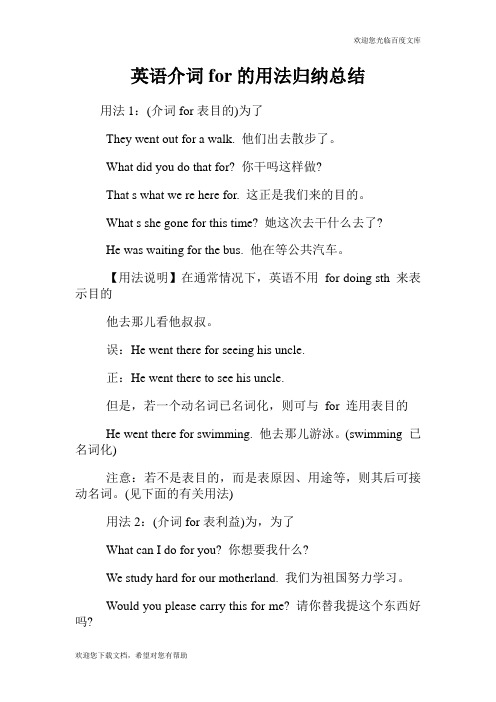
英语介词for的用法归纳总结用法1:(介词for表目的)为了They went out for a walk. 他们出去散步了。
What did you do that for? 你干吗这样做?That s what we re here for. 这正是我们来的目的。
What s she gone for this time? 她这次去干什么去了?He was waiting for the bus. 他在等公共汽车。
【用法说明】在通常情况下,英语不用for doing sth 来表示目的他去那儿看他叔叔。
误:He went there for seeing his uncle.正:He went there to see his uncle.但是,若一个动名词已名词化,则可与for 连用表目的He went there for swimming. 他去那儿游泳。
(swimming 已名词化)注意:若不是表目的,而是表原因、用途等,则其后可接动名词。
(见下面的有关用法)用法2:(介词for表利益)为,为了What can I do for you? 你想要我什么?We study hard for our motherland. 我们为祖国努力学习。
Would you please carry this for me? 请你替我提这个东西好吗?Do more exercise for the good of your health. 为了健康你要多运动。
【用法说明】(1) 有些后接双宾语的动词(如buy, choose, cook, fetch, find, get, order, prepare, sing, spare 等),当双宾语易位时,通常用for 来引出间接宾语,表示间接宾语为受益者She made her daughter a dress. / She made a dress for her daughter. 她为她女儿做了件连衣裙。
for作为介词的用法
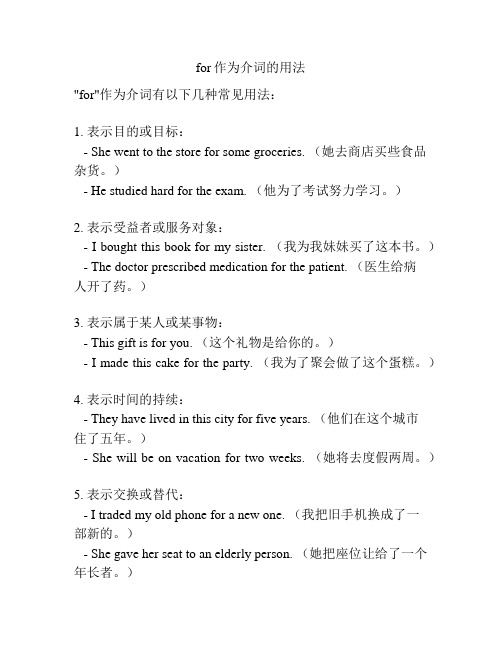
for作为介词的用法"for"作为介词有以下几种常见用法:1. 表示目的或目标:- She went to the store for some groceries. (她去商店买些食品杂货。
)- He studied hard for the exam. (他为了考试努力学习。
)2. 表示受益者或服务对象:- I bought this book for my sister. (我为我妹妹买了这本书。
) - The doctor prescribed medication for the patient. (医生给病人开了药。
)3. 表示属于某人或某事物:- This gift is for you. (这个礼物是给你的。
)- I made this cake for the party. (我为了聚会做了这个蛋糕。
)4. 表示时间的持续:- They have lived in this city for five years. (他们在这个城市住了五年。
)- She will be on vacation for two weeks. (她将去度假两周。
)5. 表示交换或替代:- I traded my old phone for a new one. (我把旧手机换成了一部新的。
)- She gave her seat to an elderly person. (她把座位让给了一个年长者。
)6. 表示原因或原由:- I apologized to her for my mistake. (我因为我的错误向她道了歉。
)- He was punished for his bad behavior. (他因为不良行为受到了惩罚。
)7. 表示价值或量度:- They sold their car for $500. (他们以500美元的价格卖掉了他们的汽车。
)- The room can accommodate up to 50 people. (这个房间最多可以容纳50个人。
介词for用法归纳
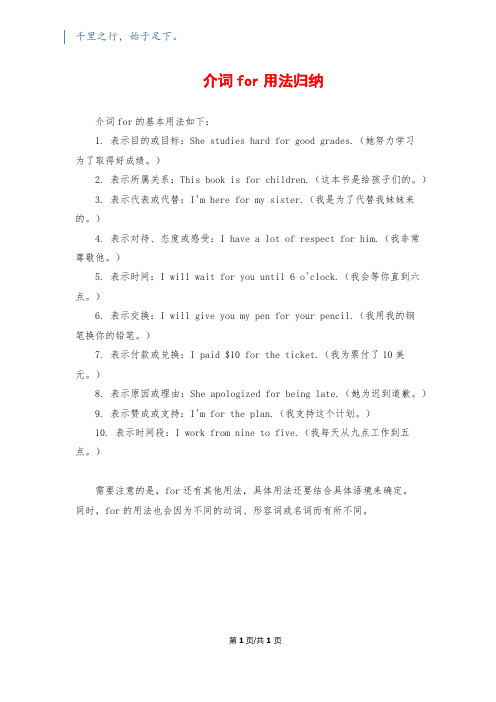
千里之行,始于足下。
介词for用法归纳
介词for的基本用法如下:
1. 表示目的或目标:She studies hard for good grades.(她努力学习
为了取得好成绩。
)
2. 表示所属关系:This book is for children.(这本书是给孩子们的。
)
3. 表示代表或代替:I'm here for my sister.(我是为了代替我妹妹来的。
)
4. 表示对待、态度或感受:I have a lot of respect for him.(我非常尊敬他。
)
5. 表示时间:I will wait for you until 6 o'clock.(我会等你直到六点。
)
6. 表示交换:I will give you my pen for your pencil.(我用我的钢
笔换你的铅笔。
)
7. 表示付款或兑换:I paid $10 for the ticket.(我为票付了10美元。
)
8. 表示原因或理由:She apologized for being late.(她为迟到道歉。
)
9. 表示赞成或支持:I'm for the plan.(我支持这个计划。
)
10. 表示时间段:I work from nine to five.(我每天从九点工作到五点。
)
需要注意的是,for还有其他用法,具体用法还要结合具体语境来确定。
同时,for的用法也会因为不同的动词、形容词或名词而有所不同。
第1页/共1页。
介词for用法完全归纳
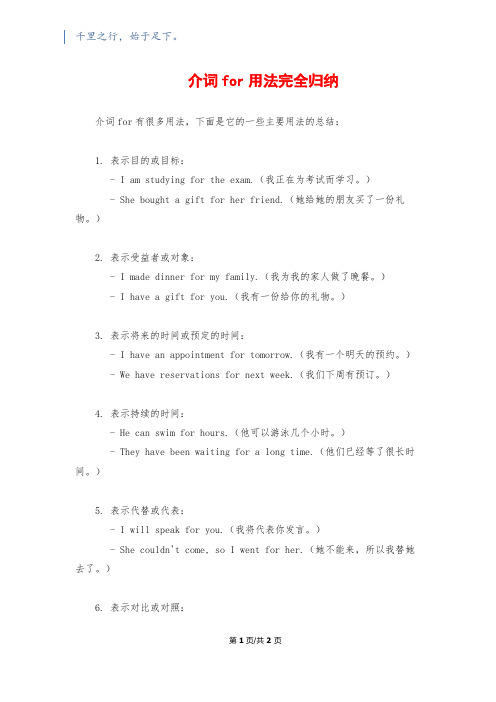
千里之行,始于足下。
介词for用法完全归纳介词for有很多用法,下面是它的一些主要用法的总结:1. 表示目的或目标:- I am studying for the exam.(我正在为考试而学习。
)- She bought a gift for her friend.(她给她的朋友买了一份礼物。
)2. 表示受益者或对象:- I made dinner for my family.(我为我的家人做了晚餐。
)- I have a gift for you.(我有一份给你的礼物。
)3. 表示将来的时间或预定的时间:- I have an appointment for tomorrow.(我有一个明天的预约。
) - We have reservations for next week.(我们下周有预订。
)4. 表示持续的时间:- He can swim for hours.(他可以游泳几个小时。
)- They have been waiting for a long time.(他们已经等了很长时间。
)5. 表示代替或代表:- I will speak for you.(我将代表你发言。
)- She couldn't come, so I went for her.(她不能来,所以我替她去了。
)6. 表示对比或对照:第1页/共2页锲而不舍,金石可镂。
- He is tall for his age.(他相对于他的年龄来说很高。
)- The weather is warm for December.(相对于十二月份来说,天气很暖和。
)7. 表示原因或理由:- I am happy for you.(我为你感到高兴。
)- She apologized for being late.(她因为迟到而道歉。
)8. 表示交换:- I traded my old car for a new one.(我用我的旧车换了一辆新车。
介词for的用法归纳总结
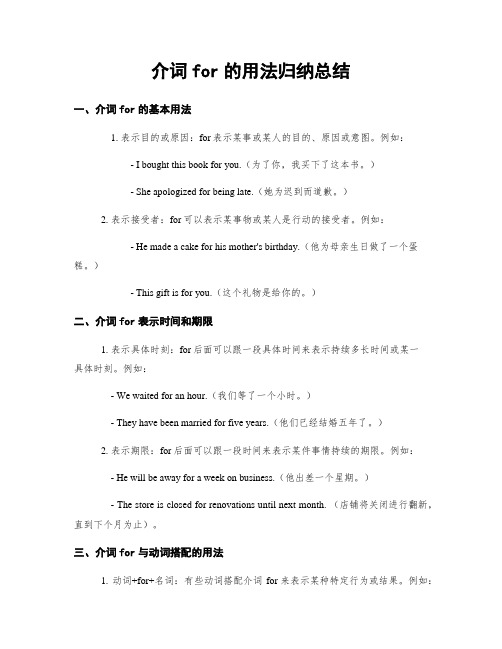
介词for的用法归纳总结一、介词for的基本用法1. 表示目的或原因:for表示某事或某人的目的、原因或意图。
例如:- I bought this book for you.(为了你,我买下了这本书。
)- She apologized for being late.(她为迟到而道歉。
)2. 表示接受者:for可以表示某事物或某人是行动的接受者。
例如:- He made a cake for his mother's birthday.(他为母亲生日做了一个蛋糕。
)- This gift is for you.(这个礼物是给你的。
)二、介词for表示时间和期限1. 表示具体时刻:for后面可以跟一段具体时间来表示持续多长时间或某一具体时刻。
例如:- We waited for an hour.(我们等了一个小时。
)- They have been married for five years.(他们已经结婚五年了。
)2. 表示期限:for后面可以跟一段时间来表示某件事情持续的期限。
例如:- He will be away for a week on business.(他出差一个星期。
)- The store is closed for renovations until next month. (店铺将关闭进行翻新,直到下个月为止)。
三、介词for与动词搭配的用法1. 动词+for+名词:有些动词搭配介词for来表示某种特定行为或结果。
例如:- Thank you for your help.(感谢你的帮助。
)- I apologized for my mistake.(我为我的错误道歉。
)2. 动词+for+动名词:部分动词和介词for可以搭配使用后接动名词形式,表示原因、目的等。
例如:- He is famous for writing novels.(他因写小说而出名。
)- I am sorry for interrupting you.(抱歉打断你了。
英语介词的用法归纳【介词for用法归纳】

英语介词的用法归纳【介词for用法归纳】介词for 用法归纳用法1:(表目的) 为了。
如:They went out for a walk. 他们出去散步了。
What did you do that for? 你干吗这样做?That’s what we’re here for. 这正是我们来的目的。
What’s she gone for this time? 她此场去干什么去了?He was waiting for the bus. 他在等公共汽车。
【用法说明】在通常情况下,英语不用 for doing sth 来表示目的。
如:他去那儿看看他叔叔。
误:He went there for seeing his uncle.正:He went there to see his uncle.但是,若一个动名词已辞汇化,则可与 for 连用表目的。
如:He went there for swimming. 他去那儿游泳。
(swimming 已名词化)注意:若不是表目的,而是表原因、用途等,则其后可接动名词。
(见右面的有关用法)用法2:(表利益) 为,为了。
如:What can I do for you? 你想要我什么?We study hard for our motherland. 我们为热忱努力学习。
Would you please carry this for me? 请你替我提这个东西好吗?Do more exercise for the good of your health. 为了健康你要多运动。
【用法说明】(1) 有些后接双宾语的动词(如 buy, choose, cook, fetch, find, get, order, prepare, sing, spare 等) ,当双宾语易位时,通常用 for 来引出间接宾语,则表示间接宾语为受益者。
如:She made her daughter a dress. / She made a dress for her daughter. 她为她女儿做了件连衣裙。
- 1、下载文档前请自行甄别文档内容的完整性,平台不提供额外的编辑、内容补充、找答案等附加服务。
- 2、"仅部分预览"的文档,不可在线预览部分如存在完整性等问题,可反馈申请退款(可完整预览的文档不适用该条件!)。
- 3、如文档侵犯您的权益,请联系客服反馈,我们会尽快为您处理(人工客服工作时间:9:00-18:30)。
介词for 的常见用法归纳
贵州省黔东南州黎平县黎平一中英语组廖钟雁介词for 用法灵活并且搭配能力很强,是一个使用频率非常高的词,也是
高考必考的重要词汇,现将其常见用法归纳如下,供参考。
1.表时间、距离或数量等。
①意为“在特定时间,定于,安排在约定时间”。
如:
The meeting is arranged for 9 o’clock. 会议安排在九点进行。
②意为“持续达”,常于last、stay 、wait等持续性动词连用,表动作持续的时间,有时可以省略。
如:
He stayed for a long time. 他逗留了很久。
The meeting lasted (for)three hours. 会议持续了三小时。
③意为“(距离或数量)计、达”。
例如:
He walked for two miles. 他走了两英里。
The shop sent me a bill for $100.商店给我送来了100美元的账单。
2. 表方向。
意为“向、朝、开往、前往”。
常与head、leave 、set off、start 等动词连用。
如:
Tomorrow Tom will leave for Beijing. 明天汤姆要去北京。
He put on his coat and headed for the door他穿上大衣向门口走去。
介词to也可表示方向,但往往与come、drive 、fly、get、go、lead、march、move、return、ride、travel、walk等动词连用。
3.表示理由或原因,意为“因为、由于”。
常与thank、famous、reason 、sake 等词连用。
如:
Thank you for helping me with my English. 谢谢你帮我学习英语。
For several reasons, I’d rather not meet him. 由于种种原因,我宁可不见他。
The West Lake is famous for its beautiful scenery.西湖因美景而闻名。
4.表示目的,意为“为了、取、买”等。
如:
Let’s go for a walk. 我们出去散步吧。
I came here for my schoolbag.我来这儿取书包。
He plays the piano for pleasure. 他弹钢琴是为了消遣。
There is no need for anyone to know. 没必要让任何人知道。
5.表示动作的对象或接受者,意为“给、为、对于”。
如:
Let me pick it up for you. 让我为你捡起来。
Watching TV too much is bad for your health. 看电视太多有害于你的健康。
Here is a letter for you. 这儿有你的一封信。
特别是有些接双宾语的词,当双宾语易位时,常用for接间接宾语,表示间接宾语为受益者。
如buy、choose、fetch、get、cook、prepare、order、spare、find等。
例如:
A nice toy was bought for the son for the mother.妈妈给儿子买了个漂亮的玩具。
Can you fetch the key for me? 你能帮我去拿钥匙来吗?
另外,作此解时也常用于句型“It is + adj+for sb to do sth”表示“对于某人来说做某事是怎么样的”。
如:
It is necessary for me to decorate the house.我有必要装饰这所房子。
It is important for you to skim through the text.浏览课文对你来说很重要。
6. 表示“当作、作为”。
作此解时常与动词take、like、keep、mistake、intend等搭配。
如:
He takes me for his teacher. 他把我当作他的老师。
I like some bread and milk for breakfast. 我喜欢把面包和牛奶作为早餐。
What will we have for supper? 我们晚餐吃什么?
My father intended me for a doctor.我父亲想要我当医生。
7. 表示所属关系或用途,意为“为、适于……的”。
如:
You are the very person for the job. 你是这工作的合适人选。
It’s time for school. 到上学的时间了。
8. 表示态度。
意为“支持、赞成、想要、想做”。
如:
Are you for this plan or against it? 你是支持还是反对这个计划?
Express your opinion to him.I’ll stick up for you.向他们说出你的意见,我一定支持你。
I am for bed. 我想睡觉了。
9.表“至于,就...而言”。
So much for today.今天就到这吧。
He is tall for his age.
10. 用于一些固定搭配中。
如:
wait for sb 等某人
for example 例如
for good 永远
stand for 代表
for one thing…;for another…一方面…;另一方面…
for oneself 独自
另外,for还可以作为并列连词,放在句首,表原因。
例如:
He found it increasingly difficult to read, for his eyesight was beginning to fail.
因为他的视力开始下降,他觉得阅读越来越难了。
